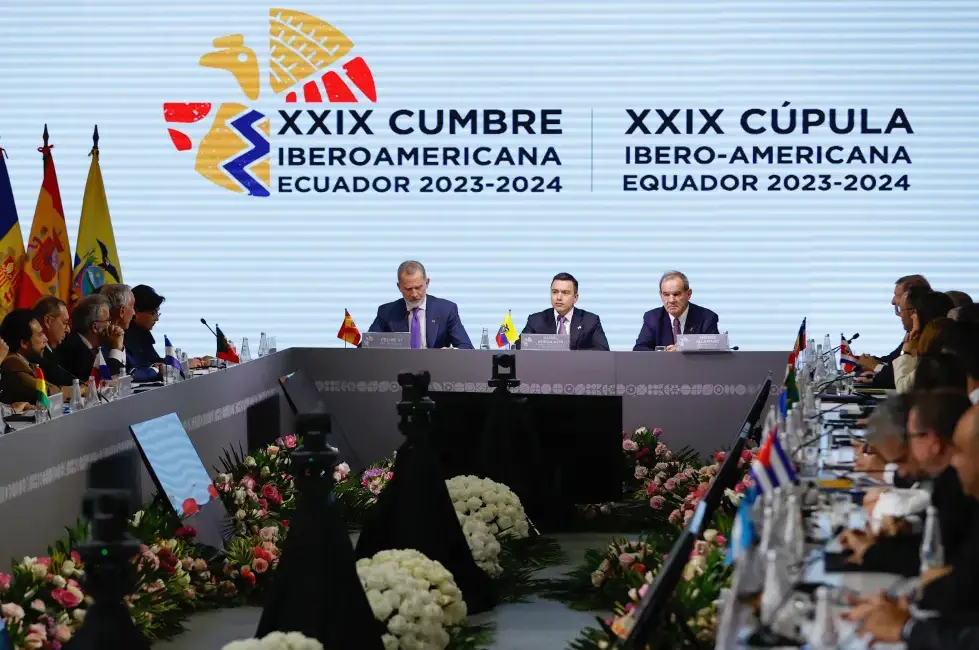The XXIX Ibero-American Summit of Heads of State and Government took place between November 12 and 15 in the city of Cuenca, Ecuador. The meeting, whose motto was Innovation, Inclusion and Sustainability, was marked by the recent elections in Venezuela, security challenges and social inequality. However, the absence of Latin American leaders, added to the socio-political crisis in the country, defined the failure of the summit.
Since Cuenca was designated as the venue for the Ibero-American Summit in December 2023, few heads of state confirmed their attendance: Argentina, Spain, Paraguay, Dominican Republic, Andorra and Portugal. In the end, no president of the region attended, only the presidents of the three European countries and the host, Daniel Noboa.
The President of Paraguay, Santiago Peña, cancelled his visit one day before the Summit began, mentioning the difficult political and social situation in Ecuador. In the case of Peru, the celebration of the Asia-Pacific Forum — APEC 2024 — which gathered in Lima during the same week dignitaries from countries such as Vietnam, Indonesia, Thailand, Taiwan, Australia, and Xi Jinping and Biden, among others, draw attention whose agenda included the inauguration of the Mega port of Chancay as a strategic enclave for the Southeast Asia-South Pacific maritime exchange.
Another of the underlying reasons that can be cited for the scarce echo that the summit had in Ecuador, is the assault to the Mexican embassy in Quito, in April 2024, where the former Vice President Jorge Glas was in asylum. The violation of the diplomatic immunity of the legation led to the rupture of Mexico’s relations with Ecuador, which are still suspended to this day. This transgression of elementary norms of international law generated the discomfort of many governments in the region.
Likewise, a week before the meeting, the vice president of Ecuador was temporarily disqualified through a resolution of the Ministry of Labor, making it impossible for her to take office as President of the Republic when Daniel Noboa takes a leave of absence to campaign for his reelection. The candidacy of Jan Topic, with options for the presidency of Ecuador, was also unclearly disqualified. It should be noted that in February 2025 Ecuador is called to the polls to choose a new president.
To the facts mentioned above must be added the complicated internal scenario of Ecuador. The persistent drought that has been plaguing the region for several months has exposed the country’s shortcomings in energy matters. The disinvestment in the energy matrix and the dependence on hydroelectric generation as an almost exclusive source of electricity, have meant that due to the lack of rain, especially in the coastal and highland regions, for almost two months there have been widespread power cuts throughout the country, with a duration that, during the week of the Summit, reached 12 hours a day.
Water rationing has been added to electricity rationing, affecting large cities such as Quito, Ambato and Cuenca. These outages have complicated different sectors of the economy, particularly affecting small businesses, whose productivity has decreased drastically without electricity supply, which has generated growing popular unrest.
Despite all these complications, security continues to be the most sensitive aspect, strained by organized crime groups that fight over territories for the trade and passage of narcotics. And as if that were not enough, the Noboa government, which boasted as an achievement of its administration to have controlled the prisons, suffered a riot in one of the largest and most dangerous prisons in the country, the Penitentiary of Litoral in Guayaquil, two days before the start of the Summit. The riot resulted in 15 deaths and 14 wounded.
The city of Cuenca enthusiastically prepared for the regional meeting, which was a stimulus for the difficult economic situation, and lived up to the event. For the summit, electricity, and water cuts were suspended in the city and demonstrations were kept away from the areas where the event was being held, which gave free rein to citizen discontent with President Noboa’s administration. And to close the negative circle that marked the context of the event, a series of forest fires broke out in those days that surrounded the province of Azuay, whose capital is the city of Cuenca.
This dramatic situation, which marked the frustrated XXIX Ibero-American Summit, evidences the lack of connection of the Government with reality. This fiasco of Ecuadorian foreign policy has only emphasized the perception that Ecuador continues to be a ship adrift.
*Machine translation proofread by Janaína da Silva













